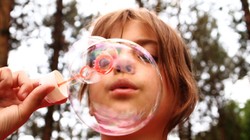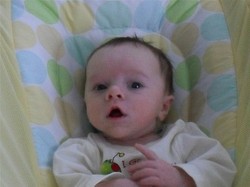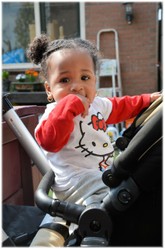Play Involves the Whole Person
Physical play is essential for developing young bodies and minds. We are not compartmentalized beings -- what affects our bodies affects our minds, our souls, and our spirits, and vice versa -- when our bodies are fit, we tend to think more clearly and to handle problems more easily. Especially for those who are kinesthetic learners, using movement in learning brings our whole persons into play.
Developing Fine Motor Skills
Through play, children practice their gross motor and fine motor skills. Fine motor skills refers to the development of the muscles in the fingers and hands. These muscles will be needed for a child to learn to hold a pencil and manouever it in forming letters and numbers. Children can develop fine motor skills by manipulating play dough, by stringing beads or cheerios, by practicing cutting with scissors, or any other activity that uses the fingers and hands.
Developing Gross Motor Skills
Gross motor skills refers to the development of the muscles required for moving one's body through space. Children need experiences of moving their bodies to gain spatial understanding. They learn about right and left, balance, and many of the forces of nature, such as gravity, thrust, and momentum. Children need to run and jump, to stretch their muscles and strengthen their bones. They develop a better sense of themselves and their capacities and limits. They also develop habits that can extend into adulthood and keep them healthy.
Using Movement to Learn
Energetic young children who may resist sitting and learning in the more traditional way can often be reached by engaging them with movement. You can teach letters, for instance, by writing a "T" with chalk on pavement and then bouncing a ball while calling out words that begin with the "T" sound. Or the child may lie on the floor and make her body form the shape of the letter she is trying to learn. A group of children could make a whole word this way with each of them forming a different letter. (This is probably only effective with children old enough to already know the individual letters. Forming letters with their bodies deepens their knowledge, helping them experience the letters in a new way.)
Your own imagination can lead you to create new ways to teach your children with their bodies. You can create jump rope ditties to emphasize concepts or make up scavenger hunts using themes you are working with. To return to the learning letters idea, for example, the children could be directed to find five things that begin with the "ch" sound. Or they could perform actions that show opposites -- fast and slow, big and little, loud and quiet, etc.









 Boston Public Gardenon 06/19/2015
Boston Public Gardenon 06/19/2015
 Remembering the Supremeson 01/20/2014
Remembering the Supremeson 01/20/2014
 How to Help Your Baby Sleepon 09/14/2013
How to Help Your Baby Sleepon 09/14/2013
 Retro Curious George Toyson 07/05/2013
Retro Curious George Toyson 07/05/2013



Comments
I think none of the existing education systems uses the power of play. It's rather the opposite - most of them try to destroy the joy of play. Even the gaming industry tries to install only predictable / profitable patterns, everything for the highest margin profit in the current quarter.
Mere theory was never ever good. Practical ideas and playing contributes more towards enhancing analytical abilities. Not only children, but adults also learn from pragmatic facts.
I agree, @happynutritionist. We are becoming too attached to our screens. We can learn with our whole bodies.
This is so true and the right way to learn, compared to sitting in front of a TV watching childrens educational television or on a tablet...you learn so much more hands on.
That's true, @AngelaJohnson. Recently I heard a talk on how daydreaming and being bored are actually important for higher level thinking. Our brains make associations we otherwise would never think of when we're allowed to wander. That's not to say disciplined work isn't important, too, but there are reasons we are the way we are.
I know that most parents want their kids to have as many opportunities as possible, and I'm a big supporter of early music experiences especially, but we have to have balance in how we raise our children. They don't have to take every lesson and be in every sport that's offered. Kids need some down time that is just theirs alone.
@Mira Thanks for your comment, Mira. The first few years are crucial.
Reading your article made me realize why those first three years are so important. And yet many parents these days leave the child with few educational toys. I enjoyed those Montessori videos and your comments.
Some children have many scheduled events because their parents want to expose them to many different things. That's a good idea but if children don't have an opportunity to daydream and be alone now and then, they might not be able to think "outside the box" as adults.
Spot on. I was an infants' teacher for 30 years and everything you have said is accurate.
And even if I didn't know that from my teaching days, the sight of my 2 year old grandson running round my house with a serving tray on his head and shouting,
"Ma-ma... I ...am ... a -- robot "...
would convince me.
TY for posting.